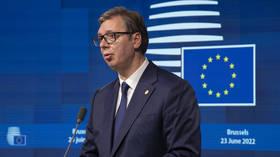Serbia explains opposition to Russia sanctions

If Belgrade caves in to EU pressure and imposes sanctions on Russia, it would then be forced to recognize Kosovo as an independent state, Serbian President Aleksandar Vucic has said. He expressed disappointment with the lack of progress regarding EU integration during an interview with Serbian broadcaster TV Pink last week.
Belgrade has cooperated with requests from Brussels, including handing over people suspected of various crimes committed during the Balkan wars, but has not received much in return, the president claimed.
“We handed over [former Yugoslav leader Slobodan] Milosevic, regardless of what we thought about him. Why did we have to give up the president? Did we become an EU member after it?” he asked.
Vucic also brought up the assassination of Serbian Prime Minister Zoran Dindic, who is believed to have been targeted because of his cooperation with international prosecutors. Vucic said he was not sure that this murder was purely a domestic affair. Dindic was shot in 2003 by a former Yugoslav special forces sniper.
Serbia has repeatedly done what was asked of it, but the promises of European integration have proven to be “false,” Vucic said. That is why it has been rejecting Brussels’ calls for anti-Russia sanctions for over 100 days, he added.
“If we impose sanctions now, we’d be told that now is the time to settle on Kosovo,” Vucic said.
Serbia pulled its troops out of Kosovo in 1999 after NATO intervened in support of local Albanian armed separatists, bombing Belgrade and other cities. NATO peacekeepers have since been deployed to the region, which ultimately declared independence and demanded recognition from Belgrade in 2008. With support from Russia and China, Serbia has resisted US and EU pressure to do so.
The EU joined the US campaign to sanction Russia in retaliation for the crisis in Ukraine. Belgrade, which has historically been allied with Moscow, is being pressured by Brussels to “align” its foreign policy with the European bloc, which Serbia wants to eventually join. Vucic previously linked his government’s rejection of Western demands to the conflict over Kosovo.












